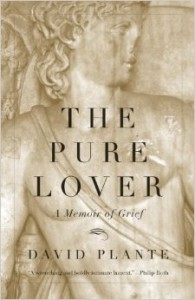 The Pure Lover: A Memoir of Grief
The Pure Lover: A Memoir of Grief
by David Plante
Beacon Press. 114 pages, $23.
AUTHOR DAVID PLANTE has made a career out of writing critically praised novels that center on family dramas and sexually ambiguous main characters. His latest book, an innovative and incantatory memoir about the family that he formed with his partner of forty years, the poet and publisher Nikos Stangos, couldn’t be any less ambiguous in its portrayal of the couple’s life together, and in its bracingly poignant meditations on Stangos’ death from brain cancer in 2004. In an era when the debate over same-sex marriage seems to be at the very heart of our public discourse, this book offers a cumulative portrait, taken in snapshots, of a long-term gay relationship that’s as valid a marriage as any other.
The most striking and significant aspect of Plante’s memoir is its form. Comprised solely of a series of fragments, each no longer than a paragraph, The Pure Lover takes on a pensive and elliptical tone that works well with Plante’s themes and content on several levels. First and foremost, the fragments convey the random spontaneity of memory itself, as Plante sifts through four decades of remembrances from his relationship, and even further back in the book’s earliest fragments, which reconstruct Stangos’ boyhood years in German-occupied Athens, Greece, during the height of World War II. These evocative fragments are similar in effect to those collected in Joe Brainard’s I Remember (1975). Each entry possesses a luminous, self-contained quality of its own, yet as much as these moments stand separately from one another in time, they also combine to create a cohesive and seamless whole.
Also present in the format of Plante’s book is the ancient Greek lesbian poet Sappho, whose works were gradually excavated as incomplete fragments on broken reeds of papyrus. This allusion is no coincidence; in a memory from the early days of his relationship with Stangos, Plante writes, “The first Greek poem you taught me was one of Sappho’s, in which she sleeps alone.” Many bits of Greek language punctuate the memoir and inform the book’s overarching structure, arranged sequentially in chapters by the letters of the Greek alphabet. While describing the subject of Stangos ‘master’s thesis in philosophy, Plante also captures the reiterative, prayer-like, and continually evolving structure of his own book: “Nietzsche’s ‘form’ was cyclical, was repetition revolving on repetition, each repetition an elaboration.”
Throughout the book’s first half, Plante delicately renders the love story that’s at the core of his memoir. From the couple’s initial meeting as twenty-somethings in 1965 in London, where, thereafter, they permanently resided, their relationship has all the alluring, almost legendary qualities of high romance: “Our Saturday afternoon naps, all chores, including shopping, done, we shut off the telephone, closed the curtains of our room, undressed, and got into bed, our arms held out to each other.” And years later: “The time we climbed up to the Acropolis, visitors were allowed to walk among the pillars of the Parthenon in moonlight … and there you kissed me, as if all your life in Athens you had wanted to do that.”
But Plante is honest about the realities of longtime companionship as well, chronicling the disagreements, youthful infidelities, and occasional rages that any such relationship must eventually endure. Of the orderly domestic life that the couple shared, Plante recalls, “I tried to be amused by your fastidiousness, but, complaining against your complaints, shouted that I would not have our lives reduced to minutia. You shouted back, ‘I will not live in bedlam.’” This straightforward style becomes most effective in the book’s final chapters, as Plante unflinchingly documents his partner’s last months. Plante’s spare yet moving descriptions of that time are reminiscent of Don Bachardy’s powerful deathbed sketches and line drawings of his lover Christopher Isherwood, who also died of complications from cancer.
In the prologue to his book, Plante mentions how the memories that make up The Pure Lover originally came back to him with no sense of order or chronology, and that much effort went into sequencing the fragments to give the memoir its structural integrity and narrative continuity. The result, as Plante hopes, is something like a Greek amphora, a vessel to contain the memory of his lover and put it on display for posterity.
Jason Roush, author of After Hours, Breezeway
, and Crosstown
, teaches at Emerson College.






